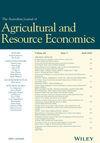Implications of U.S. Immigration Policies for North American Economies
IF 1.4
4区 经济学
Q3 AGRICULTURAL ECONOMICS & POLICY
引用次数: 5
Abstract
We develop a four-sector (labor-intensive agriculture, capital-intensive agriculture, service & construction, and manufacturing) general-equilibrium model of North American countries to analyze the effects of tighter U.S. immigration policies. Results show that these policies erode the comparative advantage of U.S. labor-intensive agriculture, causing U.S. production and exports to fall and other countries to expand their exports to the United States. In Mexico, low-skilled labor demand in labor-intensive agriculture increases as production rises. The effectiveness of U.S. tighter immigration policies depends on the substitutability between U.S. domestic and undocumented workers. Immigration policies exacerbate the wedge between Mexican low-skilled wage rate and the undocumented wage rate, intensifying the underlying cause for unauthorized entry.美国移民政策对北美经济的影响
我们建立了北美国家的四部门(劳动密集型农业、资本密集型农业、服务业和建筑业以及制造业)一般均衡模型,以分析美国收紧移民政策的影响。结果表明,这些政策削弱了美国劳动密集型农业的比较优势,导致美国的生产和出口下降,其他国家扩大了对美国的出口。在墨西哥,随着产量的增加,劳动密集型农业对低技能劳动力的需求也在增加。美国收紧移民政策的有效性取决于美国国内工人和无证工人之间的可替代性。移民政策加剧了墨西哥低技能工资率和无证件工资率之间的鸿沟,加剧了非法入境的根本原因。
本文章由计算机程序翻译,如有差异,请以英文原文为准。
求助全文
约1分钟内获得全文
求助全文
来源期刊

Journal of Agricultural and Resource Economics
社会科学-农业经济与政策
CiteScore
2.30
自引率
7.10%
发文量
0
审稿时长
>36 weeks
期刊介绍:
The mission of the Journal of Agricultural and Resource Economics is to publish creative and scholarly economic studies in agriculture, natural resources, and related areas. Manuscripts dealing with the economics of food and agriculture, natural resources and the environment, human resources, and rural development issues are especially encouraged. The Journal provides a forum for topics of interest to those performing economic research as well as to those involved with economic policy and education. Submission of comments on articles previously published in the Journal is welcomed.
 求助内容:
求助内容: 应助结果提醒方式:
应助结果提醒方式:


